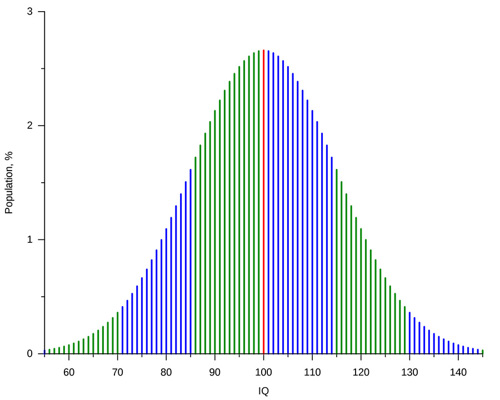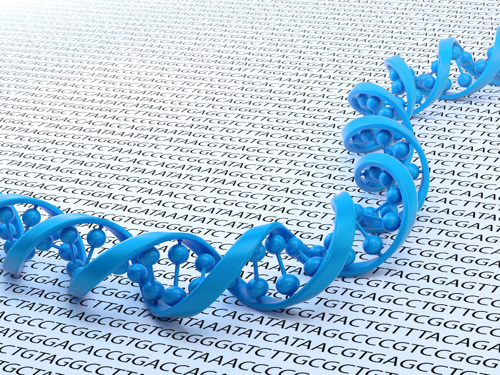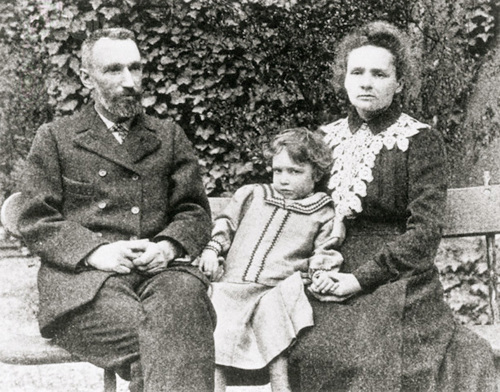
Is intelligence more of a genetic or environmental trait?
March 21, 2012

- Related Topics:
- Intelligence,
- Complex traits,
- Environmental influence
An undergraduate from Pennsylvania asks:
“I am wondering about intelligence and genetics. More specifically, the relationship between parent's intelligence and their offspring. If a really smart person and a not-so-smart person have a child, what is likely to happen genetically? Also, is intelligence more of a genetic or environmental trait?”
If a person with a high IQ marries someone with a lower IQ, their kids could have most any IQ. The same is true for two high IQ parents (although their kids will tend to have higher IQs). And for two low IQ parents.
This possible range of IQs is so wide and unpredictable because so many different genes are involved in IQ. And because the environment plays an important role too.
Notice that I have been very careful to say IQ instead of intelligence. One of the big debates in all of this is what intelligence is and how we can measure it.
IQ (or Intelligence Quotient) is one measure that a lot of people use. It isn't perfect, but it is the best measure we have for right now so that is what I'll focus on.
As I said, IQ almost certainly comes from a combination of genes and the environment. Both can explain why a child's IQ can be so different from his or her parents'.
The environment makes sense. If mom doesn't eat right or drinks too much alcohol while she is pregnant, the baby's brain won't develop to its full potential. Kids who grow up in a more stimulating environment will have higher IQs. And so on.
But genetics can explain the wide range of possible IQs too because so many different genes are involved in developing and running a brain. It is possible, for example, to inherit all the higher IQ genes from each parent and leave the lower IQ ones behind. Now the child will be brighter than the parent. And of course the opposite is possible as well resulting in a child with a lower IQ than expected.
When a trait is passed on like this it is called polygenic (many genes). Height is another example of such a trait. Click here to learn more about how these traits are passed on.
Next I want to focus a bit on how much of IQ comes from genes and how much from the environment. I think you'll see why most scientists think about half our intelligence is genetic and half is environmental.

Genes Play a Role
As I said, IQ is polygenic – lots of different genes all work together to give you your IQ. How in the world can scientists tease out what is going on? If you've ever tried a Punnett square on something "simple" like eye color, you know what we're up against!
What scientists usually do is study twins. See, identical twins have the exact same DNA while fraternal twins share only as much DNA as any two siblings. So you can tell a lot just by comparing each twin in a twin pair.
This is just what scientists have done. In the results shown below, the closer the number is to 1.0, the more similar are the IQs. So if you and your twin score a 1.0, then you have the exact same IQ. A 0.0 means you have as different an IQ as possible. Here is a sampling of the data:
- Same person (tested twice) .95
- Identical twins—Reared together .86
- Fraternal twins—Reared together .55
If two twins in an identical pair tend to have closer IQ's than two twins in a fraternal pair, then genes probably play a role in IQ. And that is just what we see.
Identical twins are definitely more likely to share the same IQ than are fraternal twins. So genes do play a role in IQ.

One of my favorite examples to illustrate the effect of genes on intelligence is the Curie family. In our society, the Nobel Prize is considered evidence of great achievement. Marie and Pierre Curie were a scientist couple and Nobel Prize winners. What's more, their daughter Irene Joliot Curie was also a Nobel Laureate.
Here is a perfect example of intelligent parents having intelligent children. The folks supporting the nature theory can argue this is due to genes.
Of course the other side can argue that Irene was raised in about the most stimulating environment possible. So they would argue that the environment explains Irene's success.
As is usual in these kinds of arguments, both sides are right. Genes and the environment each play a role.
Scientists used twins to figure this out too. The only difference is they look at twins that were raised apart.

The Environment is Important Too
When identical twins are raised apart, they have the same genes but different environments (after birth, anyway). Again, if IQ were purely genetic you'd expect where they were brought up not to matter. As you can see by these results, it does matter:
- Same person (tested twice) .95
- Identical twins—Reared together .86
- Identical twins—Reared apart .76
- Fraternal twins—Reared together .55
- Fraternal twins—Reared apart .35
In both cases, the twins are less likely to have the same IQ if they are raised in separate families. The easiest explanation is that genes are not everything…the environment is important too.
Twins are the easiest to understand but it works with other family members too. In particular, it helps to compare related and unrelated children raised in the same house:
- Biological siblings—Reared together .47
- Unrelated children—Reared together .30
As you can see, environment is not the whole answer. Genes do matter as siblings are more likely to share the same IQ as compared to unrelated children being raised together.
And there are more examples like this. Here is the complete set:
- Same person (tested twice) .95
- Identical twins—Reared together .86
- Identical twins—Reared apart .76
- Fraternal twins—Reared together .55
- Fraternal twins—Reared apart .35
- Biological siblings—Reared together .47
- Biological siblings—Reared apart .24
- Unrelated children—Reared together .30
- Parent-child—Living together .42
- Parent-child—Living apart .22
- Adoptive parent–child—Living together .19
By doing lots of studies like these, scientists have come to the conclusion that about half of your IQ comes from your genes and half from your environment. Which explains why IQ is so hard to predict!
To complicate things even more, IQ isn't even a stable trait. It can change over your lifetime. As you can see, IQ is a very tricky topic. It does seem to run in families but it is more than genes. Our environment plays a key role too.
Read More:
- Nature vs Nurture
- BBC: How good are IQ tests at measuring intelligence?
- Scientific American: Searching for Intelligence in Our Genes

Author: Arjun Adhikari
When this answer was published in 2012, Arjun was a Ph.D. candidate in the Department of Chemical Engineering, studying single molecule collagen force proteolysis in Alex Dunn’s laboratory. Arjun wrote this answer while participating in the Stanford at The Tech program.
 Skip Navigation
Skip Navigation
